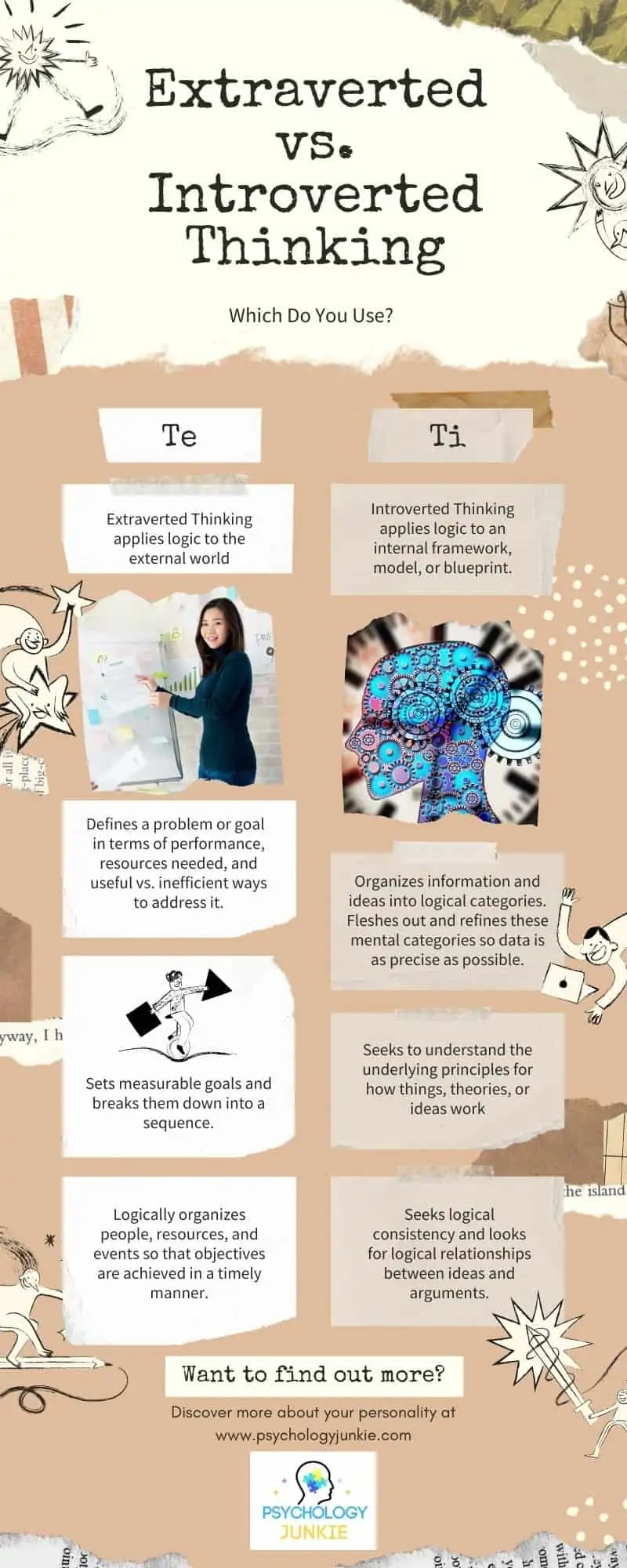Ti vs Te: The Difference Between Extraverted and Introverted Thinking
Being able to use logic and reasoning is essential to living a fulfilled life as a person. Every single Myers-Briggs® type uses thinking, even if they got a feeling result on the Myers-Briggs Type Indicator®. If we didn’t use thinking we wouldn’t be able to have any logical basis for our decisions, and we’d all be in a pretty bad place.
There are two different types of thinking: Introverted Thinking (Ti) and Extraverted Thinking (Te). One (Ti) is internally focused, organizing the inner world and applying rational thought to an inner set of principles; the other, Te, is more externally focused, applying rational thought to the outside world.

Not sure what your personality type is? Personality Hacker has the most accurate free online personality indicator I’ve been able to find. Click here to take it.

What is Extraverted Thinking? Do I have it?
Personality Types with Dominant Extraverted Thinking: ENTJs and ESTJs
Personality Types with Auxiliary Extraverted Thinking: INTJ and ISTJs
The above four personality types are going to be the most advanced at using extraverted thinking; with ESTJs and ENTJs being the most obvious and skilled extraverted thinkers.
Personality Types with Tertiary Extraverted Thinking: ESFP and ENFP
Personality Types with Inferior Extraverted Thinking: INFP and ISFP
Types with tertiary and inferior extraverted thinking will usually look to introverted feeling first to try to make decisions. If a problem can’t be solved with feeling, they will then revert to extraverted thinking. Under stress, INFPs and ISFPs can fall “into the grip” of inferior extroverted thinking. This can cause them to become uncharacteristically harsh, critical and negative towards others. This is unlike them, and usually will only come out during cases of extreme or chronic stress.
How Extraverted Thinking Works

Extraverted Thinking (Te) is all about taking the chaos of the external world and turning it into something structured, logical, and efficient. Te users don’t just dream up plans—they execute them. They want things to make sense, be organized, and, most importantly, get done. There’s no room for endless pondering or second-guessing—if something needs to happen, they’re on it.
As an INTJ, when I learn information, I want to know how to use it. I immediately am trying to figure out how to make the information applicable. That is Te. It wants to know, then use information.
In contrast, my INTP friend will want to know all the data and understand the whole system before they even care about how to apply the information to get something done (unless there’s a really pressing deadline).
Te-dominant types (ENTJs and ESTJs) are natural leaders, the ones who walk into a room and immediately start streamlining processes, delegating tasks, and making decisions. Their minds are wired for strategy, whether it’s through creating schedules, charts, graphs, or bulletproof business plans. They want structure and clear-cut efficiency, always looking for the most direct path to a goal.
Quick vs. Considered Decision-Making
For INTJs and ISTJs, who have Te as their secondary function, decision-making takes a little longer. That’s because they first filter information through either Intuition (for INTJs) or Sensing (for ISTJs) before engaging their logical Te side. While they might not appear as forceful or rapid in their execution as ENTJs or ESTJs, once they commit to a decision, they move as fast as possible to get it done.
Take someone like Warren Buffett (ISTJ). He’s known for his methodical, data-driven investment strategies. He doesn’t make impulsive moves, but once he’s gathered all the necessary information, he commits decisively—no waffling, no hesitation.
Or there’s Nikola Tesla (INTJ). He spent years dreaming up his inventions in detail before bringing them to life, but when it was time to act, his Te kicked in, allowing him to materialize groundbreaking innovations that shaped the world.
Empirical Thinking and the Scientific Mind
At its core, Te values empirical thinking—facts, data, and proven methodologies. Many Te users appreciate and prioritize the scientific method, focusing on measurable results over abstract theories. A Te user won’t just wonder if an idea works; they’ll test it, refine it, and implement it in the most efficient way possible.
Napoleon Bonaparte (ENTJ) once said, “Ambition is never in a greater hurry than I. It merely keeps pace with my way of thinking.” That perfectly captures the relentless drive of an ENTJ—once they set their mind on a goal, they push forward with unwavering momentum.
Action-Oriented and Results-Driven
Te doesn’t sit around analyzing possibilities forever—it acts. That’s why ENTJs and ESTJs are often seen as take-charge, goal-oriented powerhouses. Their decisions are based on tangible logic, not gut feelings. They focus on what works rather than what feels right.
Even those with auxiliary Te (INTJs and ISTJs) will, after some thought, emerge with a structured plan and execute it effectively. They may not rush in as quickly, but when they do move, they do so with determination and focus.
Te users are often voracious learners, but they don’t hoard knowledge for the sake of it—they use it. They turn theories into reality, ideas into action, and systems into well-oiled machines. They make things happen.
Examples of Extraverted Thinking in Action:
The Tactical Commander (ESTJ):
An ESTJ military officer is given a mission with a tight deadline. He quickly analyzes resources, assigns roles, and executes a plan to get things done on time. His focus isn’t on debating why a certain tactic might work—it’s on making sure it does work.The Master Investor (ISTJ):
An ISTJ accountant carefully tracks market trends, builds a structured investment plan, and sticks to it without getting distracted by hype. He may take time to analyze the data, but when he commits, he’s confident in the numbers.The Visionary Inventor (INTJ):
An INTJ engineer spends years conceptualizing a new AI-driven tool. She carefully refines the idea through research and simulations, but once she knows it’s viable, she executes a detailed plan to bring it to life, securing patents and investors.The No-Nonsense Parent (ENTJ)
A mother of three, Claire (ENTJ) wakes up at 5 AM, has the kids’ lunches prepped the night before, and makes sure the morning routine runs smoothly. If one of the kids starts procrastinating on their homework, she doesn’t entertain excuses—she sets a timer, breaks the assignment into steps, and makes sure it gets done. While she loves her children deeply, she believes in teaching independence and efficiency, making sure they grow up with strong work habitsThe Planful Student (ISTJ)
Jake, an ISTJ college student, doesn’t wait until the last minute to study for exams. As soon as he gets his syllabus, he organizes his entire semester, setting reminders for assignments and breaking down large projects into manageable steps. While his friends cram the night before, he’s already prepared, calmly reviewing his flashcards and getting a full night’s sleep before the test.
Am I an Introverted Thinker? How Can I Know?
Personality Types with Dominant Introverted Thinking: ISTP and INTP
Personality Types with Auxiliary Introverted Thinking: ESTP and ENTP
These personality types are going to be the most skilled introverted thinkers; with ISTPs and INTPs having the most proficient use of it.
Personality Types with Tertiary Introverted Thinking: ISFJs and INFJs
Personality Types with Inferior Introverted Thinking: ESFJs and ENFJs
The personality types with tertiary or inferior introverted thinking will rely on it after they have first filtered every bit of information through Extraverted Feeling (Fe). When it comes to decision-making, these types are much more interested in harmony and people-oriented decisions before logic and rationality. Types with inferior introverted thinking may fall “into the grip” of this function under prolonged stress; becoming uncharacteristically harsh, calculating, and cold; displaying unhealthy introverted thinking.
How Introverted Thinking Works

Introverted Thinking (Ti) is like a mental laboratory where logic is king, rules are questioned, and every concept gets dismantled and reassembled until it actually makes sense. Unlike Extraverted Thinking (Te), which is all about external order and execution, Ti is more about perfecting an internal framework—a mental blueprint for how the world works.
Ti users don’t just accept rules—they interrogate them. They don’t just memorize information—they deconstruct it. Learning isn’t about applying knowledge as quickly as possible (that’s Te’s domain); it’s about understanding it at the deepest level. If Te is a builder putting up a house, Ti is the engineer fine-tuning every single detail, making sure that not a single screw is loose before moving forward.
Constantly Evolving Logic
Te users like to make quick, confident decisions and move on. Ti users? Not so much. Their logic is always evolving, always open to refinement. They’re the people who will spend hours analyzing a concept just to make sure they’ve got it right—even if they aren’t planning to do anything with that information immediately.
That’s why Ti types tend to be skeptical of external rules, conventional wisdom, and even the scientific method itself (because, let’s be honest, science is always changing). Where a Te user will take a proven formula and apply it, a Ti user will take that same formula, break it apart, and ask, But is this the best way?
Albert Einstein (INTP) famously said, “Education is what remains after one has forgotten what one has learned in school.” Translation: Just because something is taught as a rule doesn’t mean it’s actually useful or correct. Clint Eastwood (ISTP) took it a step further: “Leave everybody alone. Let everybody else do what they want. Just stay out of everybody else’s hair.” Classic Ti—independent, skeptical of authority, and allergic to people telling them how to think.
Deep Thinkers, Efficient Doers
Here’s a fun contradiction: Ti users don’t like being rushed, but they’re obsessed with efficiency. Not forced efficiency (like a well-organized schedule)—we’re talking mental efficiency. Ti users are always looking for the smartest, most elegant solution—the one that cuts out all unnecessary steps and makes a system work better with the least effort. This sometimes makes them look lazy, but in reality, their “shortcuts” are just smarter ways of doing things.
The same applies to speech. Ti users don’t waste words. They’re direct, analytical, and allergic to fluff. However, ENTPs and ESTPs (who have auxiliary Ti) tend to be more talkative because they access Extraverted Intuition (Ne) or Extraverted Sensing (Se) first. That means they’ll throw in more anecdotes, connections, or observations before getting to the actual point—unlike their ISTP and INTP counterparts, who prefer to just say what needs to be said and move on.
How Ti and Te Solve Problems Differently
Let’s say you hand a Te user and a Ti user the same problem: a malfunctioning machine.
- The Te user (ESTJ, ENTJ, INTJ, ISTJ) will get a quick overview of the issue, identify the most efficient solution, and start fixing it immediately. Speed is key.
- The Ti user (ISTP, INTP, ENTP, ESTP) will mentally take the machine apart, analyze every component, and look for why it broke in the first place. They might take longer, but their solution is usually more optimized.
Te gets things done fast, but sometimes with errors. Ti takes its time, but when the work is finished, the system is flawless. Both approaches have their strengths and weaknesses.
Ti Examples in Everyday Life
1. The Unconventional Student (INTP)
Let’s imagine Jake, an INTP philosophy major. He rarely studies in the way his professors recommend because he finds most study techniques insufficient. Instead, he develops his own method—cross-referencing different sources, breaking theories into logical components, and reconstructing them in his mind. He might not take the most structured approach, but when it’s test time, his grasp of the material is deeper than anyone else’s.
2. The Hands-On Problem-Solver (ISTP)
A mechanic with ISTP preferences gets called to fix a car. Instead of just replacing the faulty part, he figures out why it failed and how to prevent future breakdowns. He’s not following a step-by-step repair manual—he’s relying on logic, intuition, and an instinct for efficiency to make sure the car runs smoother than before.
3. The Detail-Oriented Teacher (ENTP)
Ms. Larson, an ENTP high school teacher, loves challenging her students to think instead of just memorizing facts. If a student asks her a question, she won’t just give the answer—she’ll poke holes in their assumptions and force them to reconsider their reasoning. Her class may be chaotic at times, but by the end of the year, her students aren’t just reciting facts—they understand them.
4. The Efficient Parent (ESTP)
A father with ESTP preferences doesn’t follow strict parenting rules. Instead of forcing a rigid bedtime routine, he experiments with different schedules to see what works best for his kids. If something isn’t efficient, he changes it. He’s flexible, logical, and always finding ways to optimize daily routines with minimal effort.
Thinking – Strengths and Weaknesses
Te Users – The Good:
- Logical and rational
- Organized
- Good at scheduling
- Good at delegating
- Direct and forthright
- Efficient
- Productive
- Excellent at following through on projects
- Strong leadership skills
- Hard working
Te Users – The Bad (Not all Te users will have these traits. They tend to be more common among unhealthy/unbalanced Te users):
- Can be tactless and harsh
- Can be seen as too controlling
- Impatient
- Inflexible
- Bossy
- Can lack emotional intelligence
- Can trample other people’s needs in an effort to “get things done”
- Can be condescending to people who slow things down or question their methods
Ti Users – The Good:
- Analytical and rational
- Focused on accuracy over results
- Good at building and constructing frameworks
- Excellent at troubleshooting
- Good problem solvers
- Keen at finding inconsistencies
- Skilled at improving systems
- Have a knack for understanding how things work
Ti Users – The Bad (Not all Ti users will have these traits. They tend to be more common among unhealthy/unbalanced Te users):
- Often stubborn
- Can lack tactfulness and sensitivity
- Loathe rules and guidelines
- Can be insulting and condescending to others
- Can be paranoid about others controlling them
- Can start a lot of projects, and not finish them
- May see people as problems to be solved more than humans with emotions
- May struggle to know their own feelings
What are your thoughts?
How do you use introverted or extraverted thinking? Do you ever feel that you’re misunderstood because of your thinking preference? Let’s talk about it in the comments! I’d love to hear from you!














I am ISTP, obviously Ti user. I don’t know if this problem has to do with this, but F people tend to misunderstand me. I mean, I am so indifferent but no for the lack of emotion, I think it’s due to I get bored so easily, I don’t know. And I don’t have that high for something due to that. They usually sees me like a very distant person. I start understanding me more everyday and I let them know how I am and now they understand me better. At least, mbti was so useful for this.
it would have been nice to know which i am.. Introvert or extrovert.. When others tend to take control, I let them take the reigns.. But, if they start to screw up or act like they don’t know what to do next. I would tend to step in and tell others what we should do…
I wasn’t told this until a few months ago… from my 6th grade teacher.. it was back in 1981 or 1982..
I went to school like always. All of my class mates was there too. Our teacher wasn’t there yet. Everyone didn’t know what to do. So, I took charge and took attendance. About a few hours went by and I did as my teacher would usually do. When it came time to take everyone on a bathroom break. I had everyone form girl, boy sides and they went potty. Another teacher came by and asked me where our teacher was. I said, I don’t know. she asked, who’s in charge here then. Everyone pointed at me. I said,” Since she hasn’t come yet, I figured i’d take charge and do what she would normally do.”
She said,” Ok, do what she’d normally do. I’ll get someone to come in then. I’ll see what happened to her.”
So, I did as she told me to do. I conducted class as she did. I think the principal did come in and conducted class after lunch..
Sorry so long…
You delegate. It does not give you a Ti.
Feedback on the site. The articles are good on this site but there are so many ads and they are constantly moving and really extremely distracting. I don’t know about other types, but as an INTJ, I’m very impacted by my inferior Se and it’s almost impossible to read these articles with all the damn moving ads. I’m finding myself really annoyed and avoiding this site as a result. It’s a shame that the author has allowed a short-sighted financial decision to impede the quality of the user experience so much.
I understand your frustration. I’m not too fond of ads myself. However, I love providing food and clothes for my children more than I care about making the site as ad-free as possible, so for now ads are an annoying necessity for my family’s own livelihood. I am sorry they are so distracting and irritating though!
Susan
Regarding comment about all the ads, I literally posted the same frustration today on LinkedIn for a different site. It’s to the point where the content is being hurt because of the ads. I wish you guys would rethink your approach.
I have to say, though I don’t love the ads either, I really am enjoying all the content on this site, and appreciate having access without paying anything. I can put up with a few irritating ads to avoid a subscription fee. This kind of detailed and useful content takes time and effort to put together. That doesn’t come for free. Thanks for making it available to cheapskates like me.
Thanks for understanding Amy! I hate the ads myself and I’m the person who runs the blog! Lol. I’m hoping that because this is what supports my family that eventually I can create enough books and other products where ads won’t be necessary and it can be a more enjoyable user experience 🙂
Be honest – is that just an excuse for not better understanding what you’re reading or is there an issue with concentration before the ads..? Or is there something you’re trying to avoid? Take adderal or just stay focused and move past the ads… worth it????Promise … come on… let’s keep going ✌️
As an ENTJ/ENTP personality I found this article really informative and helpful in understanding the thinking processes of others, this has been helpful at work! I could take a cynical point of view which would be contrary to this but I won’t: thanks for a great article, it was worthwhile and I would advise keeping it up!
Thank you very much Susan for this comprehensive and informative article. I had been searching for such a good article about Te/Ti for long time and now I learned a lot here from you.
Many thanks
Thank you Adel! I’m really glad that you enjoyed this one! – Susan